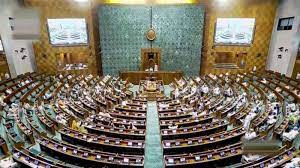PM Modi thanks lawmakers from all parties as the Lok Sabha passes the women’s reservation bill
The Women Reservation Bill was unanimously approved by the Lok Sabha on Wednesday, notwithstanding party lines.
Only two MPs opposed the measure in the voting through slips, which was supported by 434 MPs.
The Women Reservation Bill, officially known as the Constitution (One Hundred Twenty-Eighth Amendment) Bill, 2023, will head to the Rajya Sabha after passing the Lok Sabha. The bill would then be signed into effect by the Indian President.
The Women Reservation Bill, officially known as the Constitution (One Hundred Twenty-Eighth Amendment) Bill, 2023, was presented by the Narendra Modi administration on Tuesday. Parties from all sides of the political spectrum had urged for the adoption of the bill in the lead-up to the Special Session of the Parliament despite uncertainty about the session’s agenda, paving the way for its approval in the Lok Sabha with almost universal support.
Prime Minister Narendra Modi praised lawmakers from all parties after the Women Reservation Bill passed and said the measure will increase women’s empowerment.
“Delighted at the Constitution (One Hundred and Twenty-Eighth Amendment) Bill, 2023 passing in the Lok Sabha with such phenomenal support,” Modi tweeted. I appreciate the support of MPs from all parties who voted in favor of this Bill. A significant piece of legislation called the Nari Shakti Vandan Adhiniyam will help women become more politically active and empower them even more.
Almost all of the parties in the room voted in favor of the law, despite criticism over the bill’s exclusion of Other Backward Classes (OBCs) and delay in its implementation. Since it has two MPs and its leader Asaduddin Owaisi spoke against the bill, it is believed that only the All India Majlis-e-Ittehadul Muslimeen (AIMIM) cast a vote against it.
Asaduddin Owaisi, the head of AIMIM, was the sole person to oppose the bill, arguing that it would only provide reservations to “savarna women” and exclude OBC and Muslim women, who are underrepresented in Parliament. According to PTI, the AIMIM has two Lok Sabha representatives.
The census will be conducted shortly after the 2024 general elections, after which a delimitation process would be conducted, hence it has been noted that the earliest that the women’s reservation may be implemented in Lok Sabha is 2029. The seats in the Lok Sabha and the assembly of the states and UTs will be reserved for women after these two requirements have been met.
While Rahul Gandhi, the party’s leader, and other Congress members criticized the law for its exclusion of OBCs and for requiring a census and delimitation before it could be implemented, the party nonetheless backed it, as Rahul and Sonia Gandhi had previously said. The Nationalist Congress Party (NCP), Janata Dal-United (JD-U), and Bahujan Samaj Party (BSP), among other opposition parties, have also stated their support for the legislation.
A two-thirds vote of the members present and voting in the house was necessary for the Women Reservation Bill to succeed since it modifies the Indian Constitution. The Rajya Sabha would need a comparable two-thirds majority in order to enact the measure. Although the Bharatiya Janata Party (BJP), which is now in power, has a simple majority in the Lok Sabha, it lacks a two-thirds majority, thus it was forced to rely on bipartisan support for the legislation.







